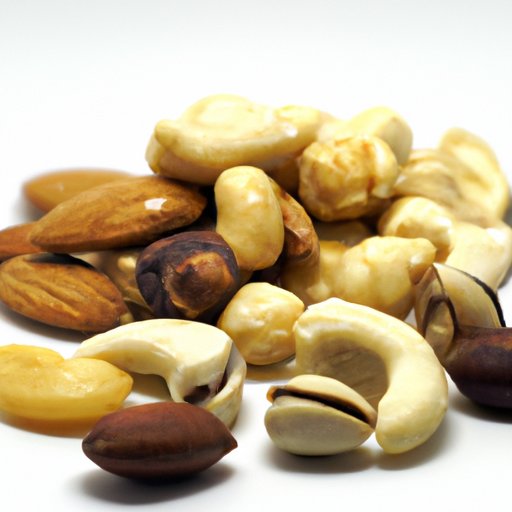Introduction
Mixed nuts are an incredibly popular snack food that can be found in virtually any grocery store or convenience shop. They offer a convenient and delicious way to get your daily dose of healthy fats, proteins, and vitamins. But are mixed nuts actually good for you? In this article, we’ll explore the nutritional benefits of eating mixed nuts, how to incorporate them into your diet, and their possible impacts on cardiovascular health.

Overview of Mixed Nuts and Their Nutritional Benefits
Mixed nuts are a combination of different types of nuts, such as almonds, cashews, walnuts, hazelnuts, pistachios, and peanuts. Each type of nut offers its own unique nutritional benefits, making mixed nuts a great way to get the most out of your snack. For example, almonds are packed with vitamin E, an antioxidant that helps protect cells from damage, while walnuts are rich in omega-3 fatty acids, which help reduce inflammation.
According to a study published in the Journal of the American College of Nutrition, consuming mixed nuts has been linked to improved metabolic health, including lower levels of bad cholesterol and triglycerides. The study also found that participants who ate mixed nuts had better blood sugar control than those who did not. Additionally, a study published in the British Journal of Nutrition found that people who ate mixed nuts every day experienced a reduced risk of weight gain and obesity.
How to Incorporate Mixed Nuts into Your Diet
Mixed nuts can be eaten alone as a snack or added to salads, oatmeal, yogurt, and other dishes. They can be roasted, salted, or even coated in chocolate. If you’re looking for a healthier alternative, try roasting them yourself at home with a bit of olive oil and your favorite spices. You can also make your own trail mix by combining mixed nuts with dried fruit and dark chocolate chips.
Different types of nuts have different health benefits, so it’s important to know which ones you should include in your mix. Almonds are rich in magnesium, which helps regulate blood sugar and energy levels. Walnuts contain omega-3 fatty acids, which are beneficial for heart health. Cashews are high in iron, zinc, and selenium, which help boost the immune system. Hazelnuts are packed with vitamin E, which helps keep skin healthy. And pistachios are a great source of fiber, which helps support digestion.

The Link between Mixed Nuts and Cardiovascular Health
Eating mixed nuts every day has been linked to improved cardiovascular health. According to a study published in the European Journal of Clinical Nutrition, people who consumed mixed nuts every day experienced a significant reduction in total and LDL cholesterol levels, both of which are major risk factors for heart disease. The study also found that mixed nuts could help improve the levels of HDL (“good”) cholesterol.
Mixed nuts are also a great source of plant sterols, which are compounds that can help reduce the absorption of cholesterol in the body. A study published in the American Journal of Clinical Nutrition found that consuming mixed nuts every day led to a significant reduction in LDL cholesterol levels.
What Are the Risks of Eating Too Many Mixed Nuts?
While mixed nuts are generally considered to be a healthy snack, it’s important to remember that they are high in calories and fat. Eating too many mixed nuts can lead to weight gain and other health problems. Additionally, some people may be allergic to certain types of nuts, so it’s important to read labels carefully and consult with your doctor before adding mixed nuts to your diet.
It’s also important to note that mixed nuts are often roasted in oil and can contain added salt or sugar. This can make them less healthy than raw, unsalted nuts. To avoid these unhealthy additives, look for brands that use minimal oil and no added sugar or salt.
Conclusion
Mixed nuts are a tasty, nutritious snack that can provide a variety of health benefits. They are a great source of healthy fats, proteins, and vitamins, and can help lower cholesterol levels and improve metabolic health. However, it’s important to remember that mixed nuts are high in calories and fat, and eating too many can lead to weight gain and other health problems. With careful moderation and mindful selection of brands, mixed nuts can be part of a healthy, balanced diet.
(Note: Is this article not meeting your expectations? Do you have knowledge or insights to share? Unlock new opportunities and expand your reach by joining our authors team. Click Registration to join us and share your expertise with our readers.)
